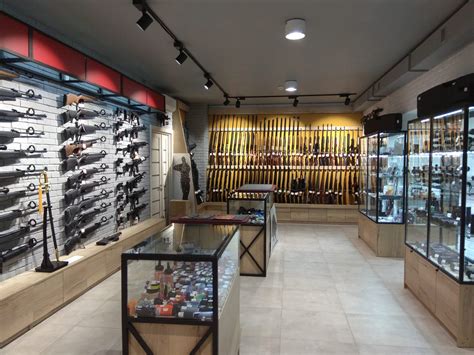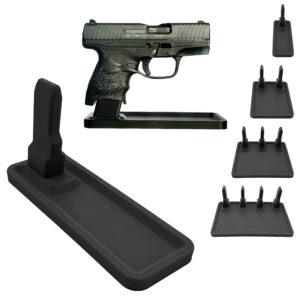
Categories:
As the digital marketplace continues to expand, e-commerce platforms for niche markets, such as gun sales, have gained importance. The unique nature of selling guns online requires adherence to strict regulations, secure transaction processes, and robust inventory management. Therefore, choosing the right e-commerce platform is critical for businesses operating within this sector.
These platforms must ensure compliance with the Bureau of Alcohol, Tobacco, Guns and Explosives (ATF) regulations and must incorporate age verification systems to prevent unlawful sales. Furthermore, they should provide seamless integration with third-party services for conducting background checks, a crucial step in gun sales, to enhance both safety and legality. Many platforms offer customizable features to address specific requirements associated with gun transactions, enabling sellers to maintain legal and operational integrity.
Security is paramount in online gun sales; therefore, these platforms must employ advanced encryption technologies to safeguard sensitive customer data. A secure and user-friendly checkout process can build trust and encourage customer engagement. Moreover, platforms that offer mobile-friendly interfaces and real-time inventory tracking can further enhance the customer experience by ensuring that potential buyers have access to accurate product information and availability.
Another vital aspect of selecting an e-commerce platform for gun sales is the extent to which it allows customization. Many platforms are flexible, providing options to tailor the site’s design, layout, and functionality to the seller’s specific brand and operational needs. Integration with existing business systems, such as point-of-sale and supply chain management, can streamline operations and improve efficiency.
In essence, while general e-commerce platforms offer basic functionalities required for online sales, those tailored for gun sales provide specialized tools and features essential for compliance, security, and operational efficiency. The right platform should cater to the unique demands of selling guns online while ensuring a smooth and secure user experience for both sellers and customers.
Selling guns online involves navigating a complex landscape of legal considerations and compliance requirements. Ensuring adherence to federal, state, and local regulations is paramount for any ecommerce platform involved in gun sales. At the federal level, the Bureau of Alcohol, Tobacco, Guns and Explosives (ATF) governs gun sales, mandating that all transactions must be conducted through a Federal Guns License (FFL) holder.
This means that while the initial purchase can occur online, the transfer of gun ownership must happen face-to-face at an FFL dealer’s location, where background checks and identity verifications are carried out.
State and local laws add another layer of complexity, as regulations can vary significantly from one jurisdiction to another. Some states impose additional restrictions on specific types of guns or have waiting periods that must be observed, underscoring the necessity for sellers to be well-versed in the laws of each state where they do business. Ecommerce platforms need to integrate systems that can verify the buyer’s eligibility, handling aspects such as age verification and the prohibition of sales to individuals with felony convictions or certain mental health disqualifications.
Another area of compliance is data protection and privacy, particularly because online gun sales require the handling of sensitive personal information. Implementing robust security measures to protect this data is crucial to avoid breaches that could lead to identity theft or unauthorized access to confidential records.
Moreover, ecommerce platforms must also comply with advertising regulations, ensuring that promotional activities do not contravene laws designed to prevent the glorification or irresponsible promotion of guns. Working closely with legal experts to ensure all marketing initiatives are in line with applicable laws is advisable.
Due diligence in terms of recordkeeping and reporting is also essential. Platforms are required to maintain accurate records of all sales and customer interactions, often for several years, to ensure transparency and accountability. Non-compliance with these legal obligations can result in significant penalties, including fines and the revocation of licenses, making thorough compliance a non-negotiable aspect of online gun sales.
When selecting an e-commerce platform for gun sales, several key features are crucial to ensure compliance, security, and smooth operation. First and foremost, any platform dealing with guns must comply with federal and state regulations. This includes the ability to validate age and perform background checks where required. Ensuring that the platform supports integration with regulatory databases and third-party systems for real-time compliance verification is essential.
Security is another critical aspect. The platform must offer robust security features to protect sensitive customer data and transaction details. This includes SSL certificates for secure data transmission, advanced encryption methods, and regular security audits to mitigate the risk of data breaches. Moreover, the platform should comply with Payment Card Industry Data Security Standard (PCI DSS) to ensure safe and secure payment processing.
Inventory management is another important feature to consider. The platform should facilitate easy management of stock levels and support for a wide range of products, from guns to accessories and ammunition. Integration with existing inventory management systems can streamline operations and prevent overselling, enhancing customer satisfaction. Shipping integration is equally important. Given the regulatory complexity surrounding the shipment of guns, the platform should provide options for configuring various shipping methods and rates, as well as the ability to select specific carriers experienced in handling gun logistics.
Having a system in place for tracking shipments and managing returns is also beneficial.
The user experience cannot be overlooked. The platform should offer a sleek, intuitive design that guides users effortlessly through product searches, checkout processes, and account management. Customization options allow businesses to tailor the shopping experience to their brand identity while ensuring clear communication with customers about legal requirements and processes. Finally, customer support mechanisms are vital, providing both businesses and customers with efficient resolution to any issues that arise.
A platform providing comprehensive support—through channels like chat, phone, and email—is invaluable in maintaining successful operations and ensuring a positive experience for both buyers and sellers in the competitive and highly regulated e-commerce landscape of gun sales.
When it comes to selling guns online, choosing the right e-commerce platform is crucial for success and compliance with legal regulations. The unique nature of guns sales requires platforms that provide robust security features, flexible inventory management, and the ability to handle complex legal constraints. One of the leading platforms often considered by guns dealers is Shopify, which offers a user-friendly interface and a plethora of customizable themes.
Despite Shopify’s general restrictions on guns, it can be a viable option if compliant with the platform’s specific guidelines and local laws related to gun sales.
Another prominent platform is BigCommerce, known for supporting the sale of certain guns and ammunition. It offers an extensive range of features tailored for online retail, such as advanced search options for customers, a flexible API, and high-level security protocols that are paramount for ensuring safe transactions involving guns. Additionally, BigCommerce’s scalability makes it attractive for gun dealers looking to expand their business.
WooCommerce, a WordPress plugin, is frequently favored for its flexibility and control over online stores. With WooCommerce, guns sellers can benefit from a range of plugins and extensions that cater to the specific needs of selling guns online, such as age verification tools and inventory trackers that handle complex product categories including serialized items.
An emerging contender in the gun e-commerce space is ArmsList, a platform dedicated to guns and related accessories. ArmsList specializes in providing a marketplace specifically for guns, giving dealers an audience that is both targeted and extensive. The platform handles many of the transaction complexities unique to guns, including legal compliance and background checks.
For any gun sales platform, maintaining stringent adherence to federal, state, and local regulations is non-negotiable. This necessitates platforms that not only facilitate sales but also offer integrated solutions for compliance, such as automated age verification, background checks, and secure record-keeping. As the online market for guns continues to evolve, sellers must choose platforms that not only meet their business needs but also uphold the highest standards of legal and ethical responsibility.
When evaluating ecommerce platforms for gun sales, understanding the associated costs and fees is crucial for choosing the best fit for your business. First, it’s important to consider the upfront costs of setting up an ecommerce site. Platforms like Shopify and BigCommerce often come with tiered pricing plans that include a wide array of features suitable for online gun sales, such as inventory management and payment processing.
Monthly subscription fees for these platforms can range from $29 to over $299 depending on the level of service and features you require.
On the other hand, platforms like WooCommerce, which integrates with WordPress, might seem cheaper initially because they are open source. However, you must consider the hosting fees, potential need for premium themes, and plugins that can add to overall costs. You’ll also have to factor in the cost of hiring developers if you need significant customization.
Transaction fees are another critical cost aspect. Platforms like Shopify charge transaction fees if you’re not using their payment gateway, Shopify Payments. These fees typically range from 0.5% to 2%, depending on the plan you’re on. BigCommerce, conversely, boasts no transaction fees, but its monthly costs can rise quickly as your sales volume increases.
Payment processing fees are often determined by your chosen payment gateway. Popular services like PayPal or Stripe generally charge around 2.9% plus a fixed fee per transaction in the United States. However, given the nature of gun sales, you may need to work with specialized payment processors accustomed to handling guns transactions, which can incur higher fees.
Lastly, additional costs related to compliance and integration must be considered. Selling guns comes with stringent legal restrictions, and you may need to invest in additional software or services to ensure compliance, increasing your overall costs. Each platform offers different levels of support and integration capabilities, which could either mitigate or exacerbate these additional expenses.
When considering the best eCommerce platforms for gun sales, security measures and payment processing options become critical aspects that require careful attention due to the sensitive nature of the products involved. Ensuring a secure online transaction environment is paramount not only to protect the business but also to safeguard the sensitive information of customers. Modern eCommerce platforms catering to gun sales must implement robust security protocols, which include end-to-end encryption, secure sockets layer (SSL) certificates, and comprehensive firewall protections to mitigate the risks of data breaches and cyberattacks.
Moreover, adherence to standards such as the Payment Card Industry Data Security Standard (PCI DSS) is essential to ensure that the platform is compliant with the industry’s security mandates.
In addition to these security measures, eCommerce platforms must also facilitate reliable payment processing options that can handle the complex nature of gun transactions. Given the regulatory scrutiny surrounding gun sales, merchants need to work with payment gateways that are not only efficient but also have experience processing transactions for guns. This involves selecting payment processors that are specifically equipped to navigate the legal intricacies associated with gun purchases, such as age verification and background checks.
These platforms often collaborate with specialized payment processors who understand the legal landscape, ensuring that both the retailer and the customer are protected.
Furthermore, offering multiple payment options can enhance customer experience and broaden the potential market. Commonly accepted options include credit and debit card processing, digital wallets, and sometimes even cryptocurrency, although the latter might present additional legal challenges. It is crucial that any chosen payment method integrates seamlessly with existing systems to provide a smooth checkout experience. Platforms may also incorporate two-factor authentication during purchases to add an additional layer of security.
By prioritizing these security and payment processing aspects, eCommerce platforms can provide a secure, efficient, and legally compliant environment for gun sales, which is essential for gaining customer trust and ensuring operational success.
When considering the best ecommerce platforms for gun sales, customer support and platform usability for sellers are crucial factors to evaluate. These elements can significantly influence a seller’s ability to manage their store effectively and address potential challenges seamlessly.
A user-friendly platform is essential, particularly for sellers who may not possess extensive technical expertise. The intuitive design of an ecommerce platform can streamline the process of setting up a store, managing inventory, and processing transactions. Platforms that feature drag-and-drop functionality, customizable templates, and straightforward navigation empower sellers to focus more on their business strategies and less on technical hurdles. Sellers often appreciate platforms that provide comprehensive dashboards which present data analytics and insights at a glance, enabling them to track sales performance and customer engagement efficiently.
Customer support is another linchpin in the selection process of an ecommerce platform. Sellers require a support system that is responsive and knowledgeable, given the specific regulations and sensitivities surrounding gun sales. A platform that offers 24/7 customer support can be incredibly valuable, allowing sellers to resolve issues or answer questions at any time. Support that includes multiple channels of communication, such as live chat, email, and phone support, provides sellers with the flexibility to reach out in the manner that suits them best.
Some platforms go beyond basic support by offering extensive resources such as help centers, FAQs, tutorials, and even dedicated account managers. These additional resources can aid sellers in navigating the complexities of ecommerce, ensuring they remain compliant with legal requirements and platform policies related to gun sales. A platform that invests in robust customer support and user-friendly design not only facilitates easier store management but also fosters a reliable and secure environment in which sellers can confidently conduct their business.
In the heavily regulated gun sales industry, these components are particularly vital, enabling sellers to maintain compliance and optimize their operations.








Colt
Colt M4 Carbine
Colt LE6920
Colt AR-15 A4
Daniel Defense
DDM4 V7
DDM4 V9
DDM4 V11
DDM4 ISR (Integrally Suppressed Rifle)
Smith & Wesson (S&W)
M&P15 Sport II
M&P15 Tactical
M&P15T
Bravo Company Manufacturing (BCM)
BCM Recce-16
BCM Recce-14
BCM MCMR Series
Aero Precision
M4E1 Series
AC-15
AR15 Pistol (Various Configurations)
Ruger
Ruger AR-556
Ruger SR-556
Ruger AR-556 MPR (Multi-Purpose Rifle)
Springfield Armory
Saint Victor
Saint Edge
Saint AR-15
PSA (Palmetto State Armory)
PSA PA-15
PSA AR-V
PSA Jakl (AR Pistol)
FN America
FN 15 Tactical Carbine
FN 15 Patrol
FN 15 DMR
Wilson Combat
Recon Tactical
Super Sniper
Protector Carbine
SIG Sauer
SIG M400 Tread
SIG M400 Elite
SIG M400 SDI
LWRC International
IC DI (Direct Impingement)
IC SPR
IC A5
Bushmaster Guns
XM-15 QRC
Bushmaster MOE
XM-15 Patrolman
Rock River Arms
LAR-15 Entry Tactical
LAR-15 Predator
LAR-15 Elite Comp
Stag Arms
Stag 15 Tactical
Stag 15L (Left-Handed Models)
Stag 15 Valkyrie
Noveske Rifleworks
Noveske Gen 4 N4
Noveske Space Invader (AR Pistol)
Noveske Recon
Anderson Manufacturing
AM-15 Optic Ready
AM-15 M4 Carbine
AM-15 Precision Rifle
Adams Arms
AA-15 Piston Rifle
P2 AARS (Adams Arms Rifle Series)
Black Rain Ordnance
SPEC15 Series
BRO Predator
Fallout 15
Diamondback Guns
DB15 Series
DB15CCMLB
DB15EB
Del-Ton Inc.
DTI-15
Del-Ton Echo 316H
Sierra 316M
Windham Weaponry
Windham SRC
Windham VEX-SS
Windham RMCS-4 (Caliber Conversion System)
Christensen Arms
CA-15 G2
CA-15 Recon
CA-15 Titanium Edition
Patriot Ordnance Factory (POF-USA)
Renegade Plus
P415 Edge
Revolution DI
LaRue Tactical
PredatAR
OBR (Optimized Battle Rifle)
LaRue Stealth 2.0
Battle Arms Development
Workhorse Patrol Carbine
BAD556-LW (Lightweight)
Authority Elite Rifle
Faxon Guns
Ascent AR-15
FX-19 (AR Pistol)
Streamline Ultralight Series
KE Arms
KE-15 SLT (Super Lightweight Tactical)
KE-15 Scout Carbine
Primary Weapons Systems (PWS)
MK1 MOD 2-M
MK116 PRO
MK107 (Piston AR Pistol)
ZEV Technologies
ZEV Core Elite Rifle
ZEV AR15 Billet Rifles
Franklin Armory
BFSIII AR-C1
Militia Model
F17-L (Chambered in .17 WSM)
Seekins Precision
SP15 DMR
NX15 Skeletonized Rifle
Havak Bravo
Aero Precision (Additional Models)
EPC-9 (Pistol Caliber ARs)
VG6 AR Rifles
Barrett Guns
REC7 DI
REC7 Gen II
CMMG
MK4 RCE
Resolute 300
Banshee (AR Pistol)
DPMS Panther Arms
Panther Oracle
Panther LR-308
H&K (Heckler & Koch)
HK MR556A1
HK416 (Military Variant)
Rock Island Armory (Armscor)
VR-80 Tactical AR (Shotgun AR Platform)
Troy Industries
Troy SPC-A3
Troy PAR (Pump Action AR)
Wilson Tactical
Tactical Recon AR
Protector Series
F1 Guns
FDR-15 Skeletonized Rifle
BDRx-15 Series
Juggernaut Tactical
JT-15
JT-10 Precision Rifle
AeroSurplus
Surplus AR-15 Rifles (Budget Models)
Thunder Tactical
AR-15 Basic Carbine
Tactical Builder Sets
Radical Guns
RF-15
Forged AR-Series
Dark Storm Industries
DS-15 Featureless Rifles
DS-10 Typhoon
DRD Tactical
Paratus
Aptus AR Rifles
Bear Creek Arsenal
BCA-15
AR Complete Upper Builds
Aero Survival Rifles (ASI)
ASR Tactical Series
Tactical Edge
WARFIGHTER Series
AR-15 Lightweight Rifles
Lone Star Armory
TX15 DMR
TX15 Carbine
HERA Arms
HERA H7
HERA AR-15 Lower Builds
IWI (Israeli Weapon Industries)
Zion-15
DRD Tactical
Tactical Modular Rifles
Quick-Takedown Rifles
V Seven Weapons
1776 Rifle
Hyperlite Rifle
Core Rifle Systems
Core15 Tac III
Core15 Patrol Rifle
Armalite (Original AR-15 Creator)
M15 Tactical
M15 A4 Carbine
DEF15 (Defensive Sporting Rifle Series)
PSA (Palmetto State Armory Additional Models)
PSAK-47 Hybrid (AR-AK Style Hybrid)
PSA Dagger (Pistol Caliber Configurations)
Odin Works
OTR-15
Odin Recon Rifle
Maxim Defense
MDX-508 PDX (Compact AR Pistol)
MDX-510 Rifle